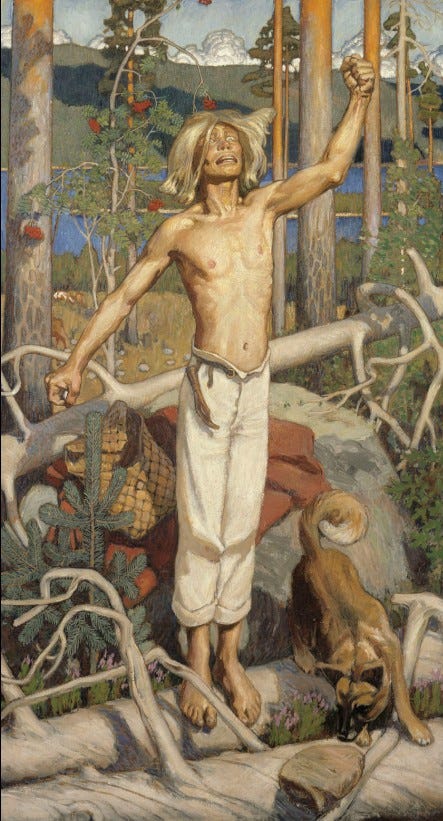I was down a rabbit hole recently (some people doomscroll, some people medicate with social media, I make odd mental connections about old world perspectives on fate). I was thinking through predestination and the weight of fate compared to American optimism. Mostly, I was just wondering if there were any good lessons to learn from the past [1] when the world seems intent on proving how fast we can devolve into chaos.
So the story (from the Finnish Kalevala [2]) of Kullervo is about someone who is dealt the worst possible hand from birth and never recovers from it. And throughout the story, misery piles on top of misery, while everything he does makes the misery worse.
His uncle Untamo kills most of the family and enslaves Kullervo. Who then destroys everything he touches, every task that he’s given, not from incompetence, but from rage.
Eventually Untamo sells him off to a blacksmith whose wife finds it funny to harass and punish him until he finally snaps. He transforms cattle into wild beasts that kill her and runs away. He discovers his family is still alive, but then things take yet another turn for the worse.
He seduces a woman who turns out to be his long-lost sister. When she discovers what happened, she kills herself. Kullervo marches out to destroy his uncle in revenge, over the objections of his mother. And when he returns home, his family is dead, killed while he was away.
So finally, all alone, Kullervo talks to his sword and asks if it will kill him. The sword answers [3], saying since it has tasted innocent blood, it is happy to drink the blood of the guilty. Exit, Kullervo.
So I’ve been fixated on this concept of inescapable fate, and different non-American takes on it are from the cheerful optimism I took in with my mother’s milk. Americans believe in self-determination – some will even go so far as to claim that accidents/disease/any bad that befalls us is because of the choices we make. There is no real fate [4].
Fate doesn't fit well with typical American thinking. We believe people can overcome their circumstances, that hard work and good choices lead to better outcomes. The idea that some people are simply doomed contradicts our foundational myths about self-determination.
But Kullervo could not escape his fate. John Calvin did not agree that we are in control either – Calvinism teaches that your fate is sealed before you're born, that your struggles against it only confirm your predestination. Calvin believed that who would be saved and who would be damned were already chosen, regardless of their actions.
I can’t shake this train of thought. Is there comfort in telling ourselves that we are in control? Or is it better to believe in the will of fate? Or just play the hand you’re dealt as best you can?
[1] ¯\_(ツ)_/¯ - I got nothing. Still wondering.
[2] Try reading something other than a business book once in a while.
[3] Which is super creepy if you think about it at all. Tolkien stole this scene for a way less messed up character. In Gustav Hasford’s The Short-Timers (the book that Kubrick’s Full Metal Jacket is based from), Pvt. Pyle’s M-14 also talks to him. The movie has half of this conversation (“Leonard talks to his rifle”), but not the creepy talking back weapon part. The book also has a different spin on the suicide scene, where the rifle forces Pyle to do it because he is too weak to control it. Which is def some shit the Devil Dogs and their Rifleman’s Creed could come up with. Also a completely different rabbit hole.
[4] “No fate but what we make.” Terminator 2.


